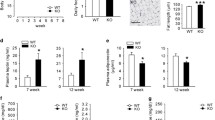Abstract
BACKGROUND: The family of uncoupling proteins is thought to play an important role in the regulation of energy metabolism by uncoupling the respiratory chain reactions from ATP synthesis. The recently discovered uncoupling protein 2 (UCP2) is upregulated in genetically obese rodent models and during long term high fat feeding.
AIM: We have examined the UCP2 mRNA levels in liver, heart and white adipose tissue (WAT) of obese ventromedial hypothalamus (VMH)-lesioned rats, during the dynamic and the early stage of the static phase of obesity, before the appearance of most of the metabolic perturbations associated with long term established obesity.
RESULTS: The amount of UCP2 mRNA was not increased in any tissue of VMH-lesioned rats relative to control animals during the dynamic phase nor during the early static phase of obesity.
CONCLUSION: These results indicate that in the rat, obesity does not necessarily lead to an increase in UCP2 expression and suggest that the up-regulation of UCP2 described in other models may be secondary to metabolic perturbations, rather than to a direct adaptative response to the increased adipose tissue content of the organism.
Similar content being viewed by others
Author information
Authors and Affiliations
Rights and permissions
About this article
Cite this article
Strobel, A., Combettes-Souverain, M., Doaré, L. et al. Rat uncoupling protein 2 (UCP2): Expression in obese ventromedial hypothalamus (VMH)-lesioned animals. Int J Obes 22, 1121–1126 (1998). https://doi.org/10.1038/sj.ijo.0800740
Received:
Revised:
Accepted:
Published:
Issue Date:
DOI: https://doi.org/10.1038/sj.ijo.0800740
- Springer Nature Limited




